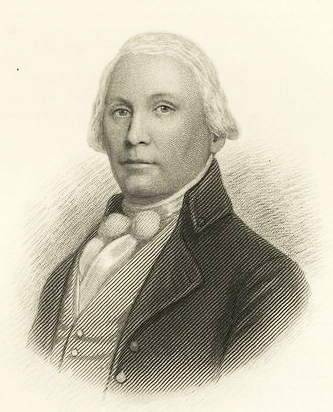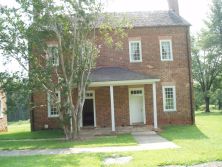McDowell, Joseph
15 Feb. 1756–11 July 1801
 Joseph McDowell, Revolutionary War officer and U.S. congressman, was born in Winchester, Va., the son of Joseph McDowell, who settled at Quaker Meadows, west of present-day Morganton in Burke County, N.C., and his wife, Margaret O'Neil. Because of the several contemporary men of the same name, the subject of this sketch was sometimes designated as "of Quaker Meadows," as "Quaker Meadows Joe," or simply as Q.M. He was the brother of Charles McDowell and the second cousin and brother-in-law of Joseph McDowell "of Pleasant Gardens" or P.G. He was also a cousin of "Hunting" John McDowell. They all moved with their families to western North Carolina. Joseph of Quaker Meadows was sent back to Winchester for his early education and then attended Washington College (later Washington and Lee) in Lexington, Va.
Joseph McDowell, Revolutionary War officer and U.S. congressman, was born in Winchester, Va., the son of Joseph McDowell, who settled at Quaker Meadows, west of present-day Morganton in Burke County, N.C., and his wife, Margaret O'Neil. Because of the several contemporary men of the same name, the subject of this sketch was sometimes designated as "of Quaker Meadows," as "Quaker Meadows Joe," or simply as Q.M. He was the brother of Charles McDowell and the second cousin and brother-in-law of Joseph McDowell "of Pleasant Gardens" or P.G. He was also a cousin of "Hunting" John McDowell. They all moved with their families to western North Carolina. Joseph of Quaker Meadows was sent back to Winchester for his early education and then attended Washington College (later Washington and Lee) in Lexington, Va.
With the outbreak of the American Revolution, McDowell served with his cousin Joseph in the Burke County militia, commanded by his older brother Charles. The regiment was involved in incursions against the Cherokee Indians under General Griffith Rutherford and in suppressing Tory uprisings in its own area. Early in 1780 it participated in the Battle of Ramsour's Mill. Joseph and his brother are credited with initiating the plan to organize a force to challenge the Tory troops under British Colonel Patrick Ferguson, and it was under the "Council Oak" on their Quaker Meadows estate that their regiment joined the "Overmountain Men" of Isaac Shelby and John Sevier and proceeded towards Kings Mountain. Just prior to the battle there, Charles left his troops and turned the command over to his brother Joseph, though some believe that it was his cousin Joseph (of Pleasant Gardens) who took charge. The Burke County regiment played a decisive role in the victory over Ferguson, after which Colonel McDowell led his troops home. However, they were soon active again and in January 1781 fought in the front ranks of General Daniel Morgan's force at the Battle of Cowpens. In 1782 McDowell led a final expedition against the Cherokee.
After the war, he, like his brother, was noted for his tolerance towards the former Tories. On several occasions he offered protection to persecuted Loyalists and ordered those formerly under his command to cease their maltreatment of them. He practiced law in Burke County and served with his brother and cousin in the state legislature; he was in the House of Commons for consecutive terms between 1780 and 1789 and then moved to the state senate, where he served from 1790 to 1795. In 1786 he held a seat in the Council of State, and in 1787 he was elected to the Continental Congress although there is no record of his attendance.
All three McDowells, Charles and the two Josephs, were delegates to the North Carolina conventions for the ratification of the federal constitution in 1788 and 1789. Of the three, only Joseph of Quaker Meadows, a strong anti-Federalist, voted against it, stating that he still had reservations as long as the proposed Bill of Rights was not approved by the requisite number of states. In 1789 he was named a member of the first board of trustees of The University of North Carolina. He served as a representative in the Third and the Fifth Congress (1794–95 and 1797–99). During his first term he was identified as a Federalist, but in the second he was a Republican and worked against various Federalist policies such as the Alien and Sedition Acts. He chose not to run for reelection in 1798.
In 1797 McDowell served on the commission to survey the boundary line between Kentucky and Tennessee. Impressed with the land he traveled through, he moved to Kentucky in 1800. In 1801, however, he returned to Burke County and died soon afterwards of apoplexy at his brother's home at Quaker Meadows. He was survived by his wife, Margaret Moffitt McDowell, and two sons and six daughters.
References:
Samuel A. Ashe, ed., Biographical History of North Carolina, vol. 7 (1908).
J. D. Bailey, Commanders at Kings Mountain (1926).
Biog. Dir. Am. Cong. (1971).
Burke County Wills and Estate Records (North Carolina State Archives, Raleigh).
John Hugh McDowell, The McDowells, Erwins, Irwins, and Connections (1918).
E. W. Phifer, Jr., Burke: The History of a North Carolina County (1977).
Raleigh Register, 18 Aug. 1801.
Western North Carolina: Historical and Biographical (1890).
Additional Resources:
"McDowell, Joseph, (1756 - 1801)." Biographical Directory of the United States Congress. Washington, D.C.: The Congress. http://bioguide.congress.gov/scripts/biodisplay.pl?index=M000423 (accessed July 31, 2013).
Image Credits:
Hollyer, "Samuel. Jos." Engraving. Print Collection, Miriam and Ira D. Wallach Division of Art, Prints and Photographs. New York Public Library Digital Gallery. http://digitalgallery.nypl.org/nypldigital/id?425071 (accessed September 30, 2013).
"Quaker Meadows." N.C. Highway Historical Marker N-3, N.C. Office of Archives & History. https://www.ncdcr.gov/about/history/division-historical-resources/nc-highway-historical-marker-program/Markers.aspx?sp=Markers&k=Markers&sv=N-3 (accessed July 31, 2013).
1 January 1991 | Inscoe, John C.